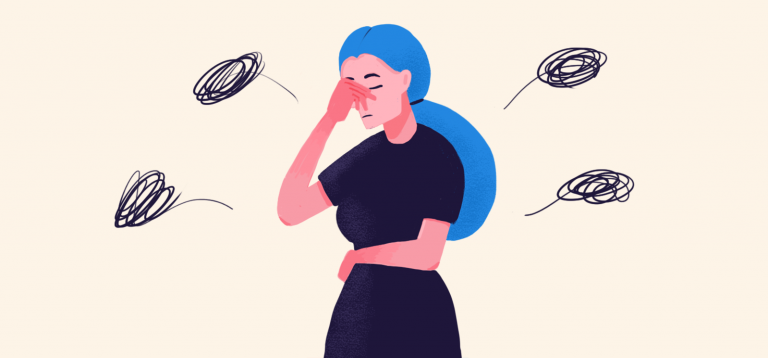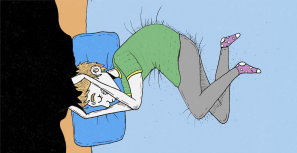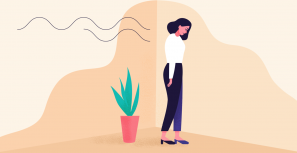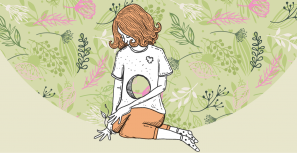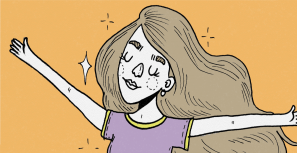Even though not much is happening, you still feel tense. You're nervous about something in your life. Maybe you're nervous about someone you care about, about your own safety or about how others are going to see you socially. Perhaps you're not even sure why you're nervous, but you clearly feel that way anyway.
那些令人焦虑的人往往令人担忧的思想与他们的紧张感情一起。焦虑本身都可以创造和加剧这种紧张。
For example:
- Anxiety can change how you think so that you find yourself nervous without an objectively justifiable reason. For example, you may be sitting alone in your room and suddenly worry that someone is outside looking at you, or that someone you know may get into a car accident. You may also just feel that something is wrong, even if you can’t figure out what. Not only will you have these worries, but they feel justifiable. No one can tell you that they are irrational.
- Anxiety may also make normal nervousness worse. For example, you may have a big test tomorrow that you didn’t study for, which creates justifiable nerves. But a person with anxiety may worry that they’ll flunk, that they’ll be kicked out of college, or that they’ll embarrass themselves.
- mak焦虑改变思维模式,这可以e you feel as though there is something to worry about even when you need not feel that way. For example, you experience chest pain and see a doctor. The doctor says nothing is wrong, and that it is probably anxiety. No matter how much you trust your doctor, you can’t help but feel nervous that they missed something - even though you know you have anxiety.
These are all examples of the ways that anxiety can both create nervousness and make nervousness worse.
Uncontrolled Nervous Thoughts
紧张性实际上是一个健康的反应。如果你没有紧张,你会采取更多的风险,可能会让自己变得危险。紧张是你的身体用来让你知道你应该害怕的工具,没有它,你不知道你需要战斗或逃离保护自己免受威胁。
How to Tell if Your Nervous Thoughts Are Out of Control
What makes anxiety frustrating at first is that many people do not know they have it. Their nervous thoughts feel completely normal. When someone develops anxiety, they may notice that they find more and more things to inspire feelings of nervousness. Yet to them, these are genuinely anxiety-producing stimuli.
If you have an anxiety disorder, you may experience physical symptoms, including the following:
- Rapid heartbeat
- Muscle tension
- Muscle weakness
- Nausea or feelings of illness
- Dizziness
- Shortness of breath
- 出汗
These physical symptoms a may be a sign that your anxiety is getting worse. Furthermore, those with anxiety often struggle to control their own nervous thoughts and may experience worst-case-scenario thinking that others cannot easily talk them out of.
For example, a person with anxiety may get an increase in their heart rate, and instead of ignoring it or assuming the explanation is simple (like too much caffeine), they may fear they’re having a heart attack. Even if a part of them knows they have anxiety, it can still be hard to turn off this type of thinking.
This sort of thinking pattern, paired with a feeling of nervousness and physical symptoms, may indicate that you’re suffering from a very real anxiety problem, especially if these experiences make it hard for you to live a normal life. But fortunately, these sorts of problems can be controlled!
Ways to Treat Nervousness
你怎么能控制你的紧张思想?只是试图推动他们不起作用。许多心理学研究证实,不可能强迫自己notthink about something. In fact,somestudieshave shown that trying not to think about something may make you more likely to think about it, because you'll have to keep reminding yourself not to think about it, thus triggering the memory
So ideally, you need to find a strategy that will control the nervousness, but not necessarily eliminate it, and thankfully there are a lot of very effective options for stopping nervous thinking. These include:
- Writing the Thoughts Out.它曾经觉得同样的紧张的想我吗s passing through your mind, over and over again? It’s almost as if your brain is terrified that you’ll forget about this thought; and so it keeps asking you to pay attention to the idea. This is a common symptom for people suffering from nervousness - and these thoughts can make the nervousness even worse. By writing out your thought on a piece of paper or journal, you'll essentially be taking the information out of your brain and putting it in a more permanent place. For some, this can provide relief by giving your mind permission to let go of the thought.
- Go Jogging.Physical tension is a common sign of anxiety and this in itself can be enough to trigger nervous thoughts. You can tackle both issues at once, simply by going for a jog. Running tires the muscles in a way that can reduce the number of anxiety symptoms you experience and possibly improve your ability to cope with anxiety.
- Mental DistractionsYou can't force yourself to stop thinking a thought. But you can make it much harder to have that thought because your focus is on so many different things. Give yourself mental distractions by turning on the TV (to something happy, of course) and doing some art or crafts. This type of combination distracts all of your senses, and makes it harder to focus on negative thoughts.
Relaxation Exercises
There are several relaxation strategies that may be effective as well, although these often need to be practiced until they become second nature. Furthermore, they need to be done correctly in order to have an effect. Some of the most popular techniques include:
- Mantra Meditation - This is the act of meditation that combines with using a word, like “OM,” that you repeat over and over to yourself slowly. The value of this word, or “mantra,” is that it eliminates outside noise and calms nervous thinking, while the meditation helps you relax.
- Deep Breathing - This is a relaxation exercise that helps you breathe from your belly rather than from your chest and replenish your CO2 levels while relaxing your heartbeat. It involves breathing in slowly through the nose, holding for a few seconds, and then breathing out slowly through the mouth.
- Progressive Muscle Relaxation - This method of relaxation utilizes the mind/body connection. It involves tensing one muscle at a time starting from your foot all the way to your head, and then releasing the muscle. This tires out muscles which is believed to relax the mind as well.
- Visualization - Visualization involves imagining yourself in another location through all 5 senses. Picture yourself in a relaxing place, focus on the sights, sounds, smells, and feel, and essentially transport yourself to a new and relaxing world.
- Yoga - Yoga is believed to help re-train the body to breathe more efficiently, provide exercise benefits, and be a calming experience that many people find relaxing.
Talk to Someone
治疗是一种控制神经想法的令人难以置信的有价值的工具,因为它直接打击有错误的思维过程。但是对于那些无法看到治疗师的人,与关心你的人交谈can be the next best thing. Not only will you get input from someone important in your life - you'll also find it harder to focus on what makes you nervous when you're talking to someone on the phone or in person.
These strategies may not stop nervous thinking forever,but they can help ensure that you're not as affected by your nervous thoughts. Each one of these is a tool that decreases the amount of focus and attention you place on those thoughts, making it easier to deal with the subsequent anxiety symptoms.
How to Stop Nervous Thinking in the Long Term
Those that are nervous all the time need to treat their anxiety like they would any health condition. Often, this is a matter of committing to getting some support from a trained professional. Just as you wouldn't treat serious illnesses haphazardly, the only way to find relief from anxiety is to give it special attention; and to make sure that you're using all the tools at your disposal to find the best way of coping with your anxiety symptoms.
